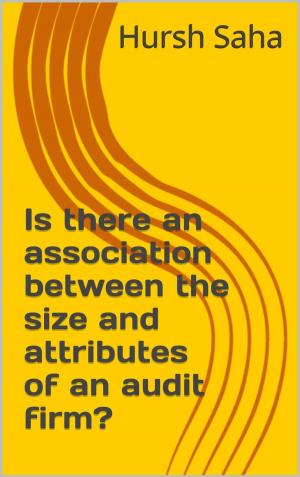Why did Germany, France and the Netherlands choose to adopt International Accounting Standards for their listed company consolidated reports? (Germany, ... International Accounting Standards Book 1)
Business & Finance, Accounting| Author: | Hursh Saha | ISBN: | 1230000284229 |
| Publisher: | Hursh Saha | Publication: | October 1, 2006 |
| Imprint: | Language: | English |
| Author: | Hursh Saha |
| ISBN: | 1230000284229 |
| Publisher: | Hursh Saha |
| Publication: | October 1, 2006 |
| Imprint: | |
| Language: | English |
Accounting Honours University Essay
In 2000 the European Union decided that all EU listed companies would have to
prepare their consolidated reports in accordance with the international
accounting standards (IAS) of the International Accounting Standards Committee
by 2005. In general, member states govern themselves but the EU has the power
to influence their self-governance. In 2000, after the EU decision, the accounting
regulators of each member state were free to decide when they wanted to adopt
IAS for their consolidated reports, provided it was done by 2005. German, French
and Dutch accounting regulators decided to adopt IAS for their nations’
consolidated reports before the 2005 deadline. In fact, German and French
accounting regulators did it in 1998 - before the EU decision of 2000. Dutch
accounting regulators adopted IAS in 2001. Why did they make this decision?
The purpose of the paper is to answer this question.
There is a body of literature which details the adoption of IAS by accounting
regulators within the EU and around the world. Examples include Nobes &
Parker (2004), Uddin (2005) and Zeff (2000). Articles from this body of literature
tend to detail the general adoption of IAS in terms of when it was done, by whom
and for what. For example, they will state something like: “1998: New laws in
Belgium, France, Germany and Italy allowed large companies to use IASs
domestically” (Uddin, 2005, pp. 22). However, many of these articles do not often
go into the specifics, in particular, into the ‘why’ element. This ‘why’ element gap
is where the motivation for this paper comes from. The paper aims to fill in the
‘why’ element gap by examining specific possible reasons why the accounting
regulators of Germany, France and the Netherlands decided to adopt IAS for
their listed company consolidated reports. This will be achieved through a
comprehensive study of the literature concerning European adoption of IAS.
In terms of the structure of the paper, first, there is a section defining the jargons
used, which are related to the paper’s research question. Secondly, a historical
background of European accounting harmonisation is first provided. Thirdly,
there is a brief overview of the accounting rules and regulations for listed
companies in Germany, France and the Netherlands before their adoption of IAS.
Fourthly, there is a discussion regarding the history of how (and therefore the
reasons why) their accounting regulators made the decision to adopt IAS.
Following that, there is an analysis of this material. Finally, a conclusion is
provided.
Accounting Honours University Essay
In 2000 the European Union decided that all EU listed companies would have to
prepare their consolidated reports in accordance with the international
accounting standards (IAS) of the International Accounting Standards Committee
by 2005. In general, member states govern themselves but the EU has the power
to influence their self-governance. In 2000, after the EU decision, the accounting
regulators of each member state were free to decide when they wanted to adopt
IAS for their consolidated reports, provided it was done by 2005. German, French
and Dutch accounting regulators decided to adopt IAS for their nations’
consolidated reports before the 2005 deadline. In fact, German and French
accounting regulators did it in 1998 - before the EU decision of 2000. Dutch
accounting regulators adopted IAS in 2001. Why did they make this decision?
The purpose of the paper is to answer this question.
There is a body of literature which details the adoption of IAS by accounting
regulators within the EU and around the world. Examples include Nobes &
Parker (2004), Uddin (2005) and Zeff (2000). Articles from this body of literature
tend to detail the general adoption of IAS in terms of when it was done, by whom
and for what. For example, they will state something like: “1998: New laws in
Belgium, France, Germany and Italy allowed large companies to use IASs
domestically” (Uddin, 2005, pp. 22). However, many of these articles do not often
go into the specifics, in particular, into the ‘why’ element. This ‘why’ element gap
is where the motivation for this paper comes from. The paper aims to fill in the
‘why’ element gap by examining specific possible reasons why the accounting
regulators of Germany, France and the Netherlands decided to adopt IAS for
their listed company consolidated reports. This will be achieved through a
comprehensive study of the literature concerning European adoption of IAS.
In terms of the structure of the paper, first, there is a section defining the jargons
used, which are related to the paper’s research question. Secondly, a historical
background of European accounting harmonisation is first provided. Thirdly,
there is a brief overview of the accounting rules and regulations for listed
companies in Germany, France and the Netherlands before their adoption of IAS.
Fourthly, there is a discussion regarding the history of how (and therefore the
reasons why) their accounting regulators made the decision to adopt IAS.
Following that, there is an analysis of this material. Finally, a conclusion is
provided.















